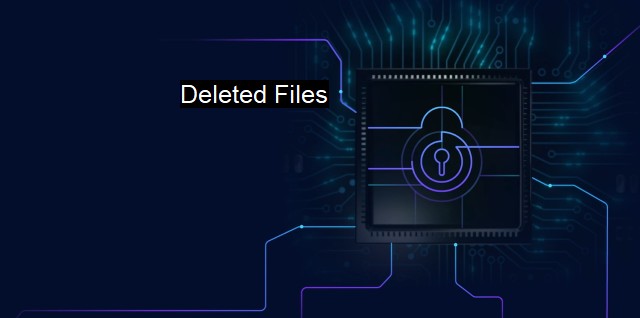What are Deleted Files?
Understanding Deleted Files in Cybersecurity and Antivirus: Types, Deletion Processes, and Recovery Methods
In the cybersecurity and antivirus realm, the term "deleted files" carries a certain amount of significance. At a basic level, "deleted files" refers to data that has been removed from a computer's file system. Altho-ugh the term appears simple, it is nonetheless multilayered and critical, particularly from a cybersecurity perspective, because often, deleted files aren't completely obliterated from a system and can hence pose potential security hazards."Deleted files" usually refer to those data files that users eliminate from their devices, like computers, smartphones, or electronic storage systems intentionally or accidently. The deletion process involves removing the connection between the data and the user interface, making the file or data invisible or inaccessible on the surface. in many scenarios, the data associated with the "deleted file" is not instantly eradicated from the system's hard drive. Instead, the space where the data existed is marked as available for reuse.
In this context, it becomes vital to highlight the significance of antivirus and cybersecurity software. Antivirus software performs an essential role in safeguarding the computer from various threats that might exploit these "deleted files." Despite being removed from the file system's user-accessible regions, these files may still be present in hard-to-reach sectors of the software system and could be employed as a pathway for malicious activity.
Operating systems typically deal with file deletion by tagging the space as available rather than eliminating the data immediately. The actual sectors on the disk where the data were stored don't usually get overwritten until the space is needed for new data. This approach allows data recovery tools to restore deleted data by reconstructing the file system's metadata.
This constitutes a potential cybersecurity risk. Cybercriminals can exploit this facet to recover sensitive and confidential data from the deleted files by employing such data recovery tools. This possibility is particularly alarming for businesses and individuals who store sensitive data like financial information, personal identification details, proprietary data, or even national security-related information.
Hence, how "deleted files" are treated has huge ramifications for cybersecurity. The prevalent process where data remains on hard drives even after deletion exposes vulnerabilities ripe for exploitation by cybercriminals. Thus, there's a growing need for more sophisticated methods to permanently and thoroughly eliminate data to minimize cybersecurity risks.
This is where the concept of "secure deletion" becomes significant. Secure deletion caters to the permanent removal of a file or data from a system, ensuring its non-recoverability. This is often achieved through a method called "data wiping" or ”data shredding”. The process involves overwriting the specific storage space of the deleted file with arbitrary data or zeros. This overwrite ensures that no traces of the original file's contents remain, effectively eliminating the risk of malicious data extraction.
Antivirus software and security suites often strike to help by ensuring that these data remnants buried deep within the system don't become accessible to hackers. They perform periodic system-wide scans, ensure robust password policies, usage of encrypted connections, and implement proactive approaches towards identifying possible security breaches. Many premium antivirus solutions even offer file shredders that securely delete the files bypassing the recycle bin and any possible traceable route, minimizing the risk that cybercriminals could restore deleted data.
"deleted files" may seem an ordinary part of daily computer use, but they have profound cybersecurity implications. Given the dormant data presence, careful consideration must be given to a more reliable, secure deletion process. Simultaneously, the use of robust antivirus software that can safeguard against potential data breaches is paramount.

Deleted Files FAQs
What happens to deleted files in a system that has antivirus software installed?
Antivirus software may quarantine or delete files that are deemed as malware or suspicious. Quarantine means that the file is isolated in a safe area and cannot execute until it is either restored or permanently deleted. On the other hand, deleting a file means that it is permanently removed from the system and cannot be retrieved.Can deleted files be recovered after being removed by antivirus software?
It depends on the action taken by the antivirus software. If the software quarantines the file, it may still be recovered if it hasn't been permanently deleted. However, if the file has been permanently deleted, it may not be recoverable.Can deleted files still pose a threat to my system?
Yes, deleted files can still pose a threat to your system. Malware or viruses could still linger in deleted files even if they're no longer executable. They may also be used to store sensitive information that can be retrieved by attackers. It is important to ensure that all deleted files are permanently removed from your system.What should I do if I accidentally delete an important file?
If you accidentally delete an important file, it is best to stop using the system immediately and not save any new data. There are various file recovery tools available that may be able to retrieve the deleted file. Alternatively, you can check your system's recycle bin or trash for the deleted file. If all else fails, seek help from a cybersecurity professional.| | A | | | B | | | C | | | D | | | E | | | F | | | G | | | H | | | I | | | J | | | K | | | L | | | M | |
| | N | | | O | | | P | | | Q | | | R | | | S | | | T | | | U | | | V | | | W | | | X | | | Y | | | Z | |
| | 1 | | | 2 | | | 3 | | | 4 | | | 7 | | | 8 | | |||||||